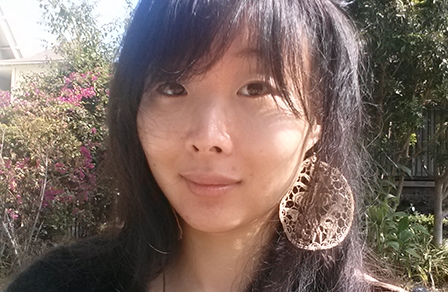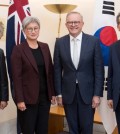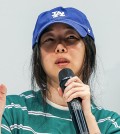- California Assembly OKs highest minimum wage in nation
- S. Korea unveils first graphic cigarette warnings
- US joins with South Korea, Japan in bid to deter North Korea
- LPGA golfer Chun In-gee finally back in action
- S. Korea won’t be top seed in final World Cup qualification round
- US men’s soccer misses 2nd straight Olympics
- US back on track in qualifying with 4-0 win over Guatemala
- High-intensity workout injuries spawn cottage industry
- CDC expands range of Zika mosquitoes into parts of Northeast
- Who knew? ‘The Walking Dead’ is helping families connect
A Must-Read: Hannah Sanghee Park
The Korean American recipient of the Walt Whitman Award
dreams of writing and running a television show one day

Hannah Sanghee Park, 27, is a rising poet who won the 2014 Walt Whitman Award for “The Same-Different.” (Photo courtesy of Park)
By Tae Hong
“In all the farewells in all the airports in all the profane dawns,” the first words of a poem by James Galvin reads, “In the Fiat with no documents on the road to Madrid.”
A University of Washington freshman sitting in an English class read these lines of “Cherry Blossoms Blowing in Wet, Blowing Snow” and decided that she, too, wanted to write poetry.
“I remember sitting there, I was 18, and thinking, ‘I did not know language could do this,’” Hannah Sanghee Park says. “Or create these feelings in me.”
Years later, she would go on to study under Galvin at the historied Iowa Writer’s Workshop. And years after that, she would become the recipient of the 2014 Walt Whitman Award, a prestigious annual honor given to unpublished poets.
Her manuscript, “The Same-Different,” was chosen by Pulitzer-Prize-winning poet Rae Armantrout, who lauded it as a “literally dazzling debut.”
Park, whose work will be published, purchased and distributed by the Academy, calls herself an “academic squatter” whose journey with words is just beginning: The 27-year-old writer is a screenwriting student at the University of Southern California’s film school, where she nurses dreams of one day writing and running a television show.
Literary period dramas are her current focus, although she wants to explore comedy in the future.
“It’s been interesting to try to sustain both poetry and screenplay writing,” she says. “It’s been a juggling act, but both of them inform each other.”
She credits her interest in screenwriting to a transformative year-long trip to Seoul for a study abroad program with the Fulbright Scholarship in 2011.
What started as a project to research Korean folklore and to write a collection of English poems to bring the stories back to English-speaking audiences turned into an appreciation for Korean independent cinema — it combines a sense of the poetic and cinematic in a way she wants to attempt, she says — and for what she could do with media.
The realization that she wanted to work with films and television after finding motivation in the dearth of Asian American representation in the media stuck with her all the way to USC, she says.
Poetry, though, is still in the equation. After all, she is a poet with a 2013 Ruth Lilly Poetry Fellowship and a Whitman Award whose manuscript will be published in 2015. Within a small poetry market and backed by the Academy, “The Same-Different” is a nearly guaranteed success in the poetry world.
She also has eventual hopes of gaining enough fluency to write Korean poems.
“My [Korean] writing — my writing is terrible,” she laughs. “A lizard could write better Korean than me.”
The Washington native says changing levels of confidence determine the state of her Korean at any time.
“At the peak of my Korean language skills, I was trying to see what it would be like to think through the eyes and ears of a translator,” she says. “My approach to it was very rudimentary, very caveman-like, going through the dictionary saying, ‘Does this sound good?’”
In English, her process is fluid. She draws inspiration from word dissection, from etymologies, from word pairings and starting lines.
Her intended audience, she says, is nobody and everybody — the goal is to reach people from different walks of life in any way.
“I’m kind of voracious in everything I want to do, a tad bit too ambitious,” she says. “I like when a poem does everything. I like when it gets at me from the ear, the eye, the heart, the funny bone. When it just punches you in the gut. I like when you can read a piece of paper with words on it, and it can move you or remove you from where you are.”















